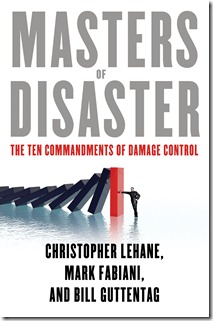Book Review: Masters of Disaster
It’s difficult to write a “how to” book on crisis communications. Each crisis has its own set of unique challenges, and what works well in one case may cause a company’s demise in another.
But authors Christopher Lehane, Mark Fabiani, and Bill Guttentag—the first two former high-ranking White House officials and the third an Ocsar-winning filmmaker—do a wonderful job of arming readers with critical information they need to know to survive a personal or professional crisis.
Their book, Masters of Disaster: The Ten Commandments of Crisis Control, rightly points out that “we no longer have conventional news cycles but cycles within cycles.” In today’s media age, they write, crises “have become the normal state of nature,” and “scandal is an endlessly self-renewing resource.”
Therefore, preparing in advance for crisis is more important today than ever before. Masters helps readers do that by detailing “Ten Commandments” of damage control, the purpose of which are to help restore trust to companies in crisis. Those rules include admonitions to speak to your core audience, avoid feeding the fire, respond with overwhelming force, and “destroy” opponents who dissemble.
But the greatest strength of this book is its case studies. The authors went into great detail on numerous recent scandals—ranging from those affecting Toyota, British Petroleum, Penn State University, Tiger Woods, baseball’s steroid users, and a few politicians. The case studies read like good fiction, and I found myself flying through those pages. Even as a daily blogger immersed in media training and crisis communications issues, I learned a lot of new detail from their well-researched accounts.
I have two small critiques of the book. First, the authors used a bit too much violent imagery to describe crisis communications for my taste (e.g. a knife fight in a telephone booth, a shield and a sword, live ammo). Second, one case study about a 2000 political ad which showed a subliminal message of the word “rats” felt too small for the book. Yes, the authors were involved in defending against the ad, but the pettiness of that incident is a good reminder of why so many people hate Washington.
But those two small items aside, I enthusiastically recommend the book. The author’s insights are sound, were earned through many years of hands-on experience, and offer a solid template for companies and organizations planning for crisis.
One question I always ask myself is whether readers will get a good value when purchasing a book. Masters of Disaster is worth well more than its cover price.
Masters of Disaster is available in hardcover here and for the Kindle here.
Please tune in tomorrow for a detailed Q&A with the authors, on Wednesday for a terrific excerpt from the book, and on Thursday for a list of the “Ten Commandments of Damage Control.”
